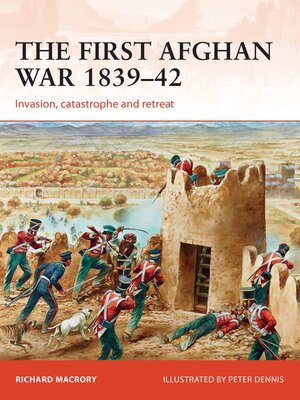The First Afghan War 1839–42
ebook ∣ Invasion, catastrophe and retreat · Campaign
By Richard Macrory Hon KC

Sign up to save your library
With an OverDrive account, you can save your favorite libraries for at-a-glance information about availability. Find out more about OverDrive accounts.
Find this title in Libby, the library reading app by OverDrive.



Search for a digital library with this title
Title found at these libraries:
| Library Name | Distance |
|---|---|
| Loading... |
A highly illustrated study of the First Afghan War, a bitter setback for British forces in the Great Game played out in the 19th century.
In 1839 forces of the British East India Company crossed the Indus to invade Afghanistan on the pretext of reinstating a former king Shah Soojah to his rightful throne. The reality was that this was another step in Britain's Great Game – Afghanistan would create a buffer to any potential Russian expansion towards India.
This history traces the initial, campaign which would see the British easily occupy Kabul and the rebellion that two years later would see the British army humbled. Forced to negotiate a surrender the British fled Kabul en masse in the harsh Afghan winter. Decimated by Afghan guerilla attacks and by the harsh cold and a lack of food and supplies just one European – Dr Brydon would make it to the safety of Jalalabad five days later.
Richard Macrory goes on to trace the retribution attack on Kabul the following year, which destroyed the symbolic Mogul Bazaar before rapidly withdrawing and leaving Afghanistan in peace for nearly a generation.
In 1839 forces of the British East India Company crossed the Indus to invade Afghanistan on the pretext of reinstating a former king Shah Soojah to his rightful throne. The reality was that this was another step in Britain's Great Game – Afghanistan would create a buffer to any potential Russian expansion towards India.
This history traces the initial, campaign which would see the British easily occupy Kabul and the rebellion that two years later would see the British army humbled. Forced to negotiate a surrender the British fled Kabul en masse in the harsh Afghan winter. Decimated by Afghan guerilla attacks and by the harsh cold and a lack of food and supplies just one European – Dr Brydon would make it to the safety of Jalalabad five days later.
Richard Macrory goes on to trace the retribution attack on Kabul the following year, which destroyed the symbolic Mogul Bazaar before rapidly withdrawing and leaving Afghanistan in peace for nearly a generation.







